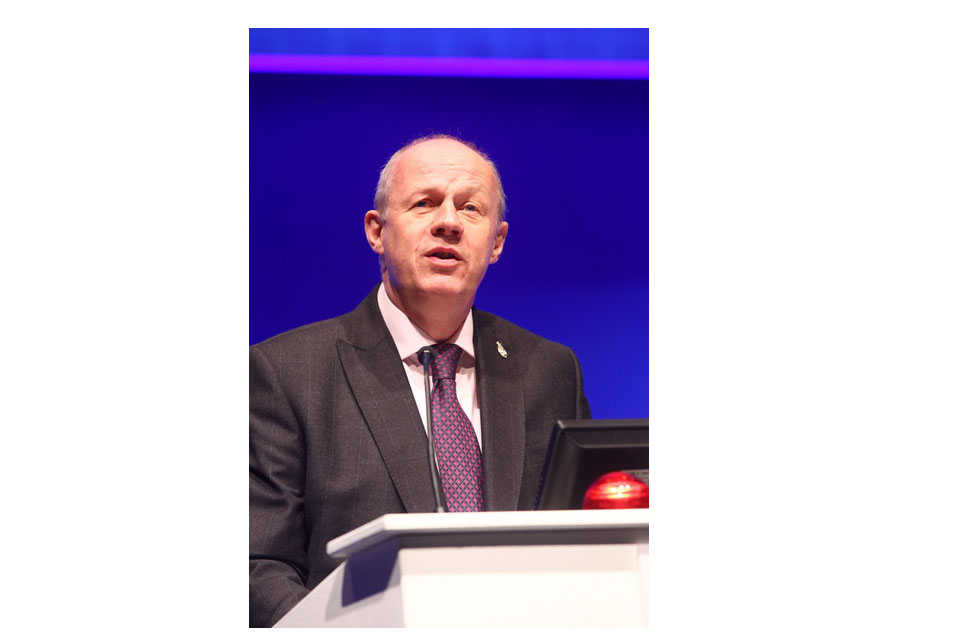Damian Green’s Police Federation (Constables’ Conference) speech
Speech given by Damian Green on Tuesday 20 May.

I want to start with the basics. When I started as Policing Minister I said I’d be a candid friend to the police.
I admire what the police do, as does every person in this country, apart from criminals. But that doesn’t mean everything is marvellous and nothing needs to change.
It means accepting some things need to change urgently, but not the basics of good policing and what makes a good police officer. The qualities required to be a good police officer are many: bravery, intelligence, fitness, maturity, sound judgement, self control, integrity, honesty, compassion, courtesy, perseverance and patience. Taken together these qualities make for remarkable people. And we are lucky to have so many in the police.
But it is not a question of just having these qualities; it is being able to demonstrate them, day after day and at often uncivilised hours and in the face of uncivilised people. And I pay tribute to the vast majority of police officers who do this.
The work the police do is frequently dangerous, violent, distressing, physically and emotionally tough, professionally risky, intellectually taxing and requires restraint under intense provocation.
Many people forget this daily reality. Those who are getting by on daily headlines sometimes feel cynical and jaded. But I am lucky – I have the opportunity to get out and about, to see our officers in action. This always reinforces my confidence in them and drives away any cynicism I have. When an officer goes to the aid of a victim of crime they are met with relief; and I suspect that relief is tinged with an implicit and instinctive trust in the officer.
Your members deserve this trust; they deserve the confidence of the public. They face the public day in and day out and maintaining and developing confidence is vital if police officers are to do their job. Think how demoralising it would be for officers if they were not trusted by the public. And think how much more difficult this would make their job. We cannot allow the public’s confidence in the police to be undermined any further, which is why it is important to be candid. There are no two ways about it: it has been a difficult year for policing.
You will all have seen the Home Secretary’s statement to Parliament on the Ellison Review. She described the findings as ‘profoundly shocking’ and ‘of grave concern’. She was right.
And there was ‘plebgate’. One officer in jail, 3 police officers dismissed and investigations continuing.
I won’t go on with this list of horrors but there are other difficult situations affecting the reputation of the police.
The cumulative impact of the recent controversies and the negative headlines they generated cannot be underestimated.
It is vital to restore the morale of our police officers and the police staff; the vast majority of whom are honest, hard working and wholly committed to the job.
They demonstrate everything that is good about public service. I make this point every time I speak about the police, or give an interview, and I can assure you I will continue to do so.
Transparency, integrity and ethics
This is why the government is determined to do more to improve police integrity. Let me remind you of just a few of the necessary reforms we are introducing.
First, the College of Policing has drafted a Code of Ethics which sets out clearly the high standards of behaviour expected from all police officers and staff. I want this code to be owned by each individual officer and staff member.
Second, we are legislating for a new criminal offence of police corruption.
Third, we are establishing a national register of ‘struck-off’ officers to record those dismissed for misconduct, ensuring that those individuals are not re-employed by the police.
Fourth, we are also strengthening the Independent Police Complaints Commission so that it will have responsibility for dealing with all serious and sensitive cases involving the police.
We are also advertising for Direct Entry to Superintendent and reforming stop and search.

Freeing up police time - IT
There is a lot going on. But in the midst of these reforms we must not forget that trust and confidence also grows with familiarity – the public seeing officers out and about and being able to talk to one when they need to.
One of our great contributions to this is a vision of digital policing by 2016: where officers are able to receive information on mobile devices out on the street, helping them make better decisions to protect the public; where officers are able to digitally record evidence when they are out and about and upload it straight to digital storage which the CJS draws from; and where the public can contact the police in a range of digital ways as they would expect from other 21st century services.
This is something I hear powerfully from officers on the street. They want the same digital capabilities on duty as they have off duty, and they are absolutely right to demand this.
Exploiting the opportunities presented by new technology is not just about implementing quicker and more efficient processes – although, of course, that is important – but it is about law enforcement keeping ahead of law breakers – and providing the police with the tools they need to do their job.
Reform
Let’s embrace modern technology and exploit it so officers can get on with their job. But technology on its own cannot restore public confidence in the police.
This is where the Police Federation has such an important role: inspiring public confidence in the police and ensuring that that confidence is not misplaced.
That restoration of confidence must begin at home – here inside the Federation. One of the most telling comments from Sir David Normington in his independent review of the Federation came from a Suffolk constable who said: ‘The publicity around the ‘Plebgate’ matter has eroded any credibility the Police Federation had. The public have little interest in the Police Federation and judge the service as a whole’.
This constable is not alone; I think that’s right. Normington makes the important point that many of the Federation’s members believe that the public makes little distinction between the Federation and police officers.
We have heard about the Home Affairs Committee’s report on the Police Federation which was published last week, which did paint a shocking picture. Of course reports like that get publicity. The public will be judging your members against the unacceptable behaviours exhibited by a very small number of people.
Is it fair on your members if public misgiving over the Federation is allowed to tarnish their reputation as police officers?
Of course it is not fair. This is why reform of the Federation is so important.
Let me emphasise this: it was brave of the Federation to commission the Normington Review. It’s your report. You commissioned it. It was inevitable but encouraging to see that Normington’s recommendations are generating a healthy debate, including in your own magazine. The editor has recently written in an editorial that the Federation has ‘lost its way’. But she went on to say that if the Federation takes Normington’s recommendations seriously it paves a way to building a better and more effective force of persuasion. I agree with this.
It is clear your members do as well. I think the most interesting figure in the Normington Review was that a staggering 91% of members are demanding change.
This overwhelming call cannot be ignored.
Let me be clear: as the Home Secretary has been quoted as saying, I would much prefer the Federation to reform itself this week. It is your decision, your choice. Please grasp it.
Listen to your members; listen to Normington; listen to the Home Affairs Committee; and build a better force of persuasion – a better Federation.
Conclusion
Let me finish by quoting one of the Peelian principles: ‘the power of the police to fulfil their functions and duties is dependent on public approval of their existence, actions and behaviour and on their ability to secure and maintain respect’.
Ultimately, securing and maintaining the public’s respect and restoring the public’s confidence in the police is down to the Federation and its members. But in Government we are not going to abrogate responsibility; I assure you I will do what I can to help. If necessary Government will legislate for reform. But you and your colleagues need to grasp the nettle and make the Federation an organisation your members support and have confidence in.
It will take courage to implement Normington’s recommendations, I don’t doubt that. But I want you to succeed – and I say that not just as policing Minister; I say that as a concerned member of the public.
I want the police to succeed and be held in high regard. At this week’s conference the decisions you make can take a big step. I urge you to seize the chance and ensure the Federation plays a full role in restoring the confidence your officers deserve from the British public.